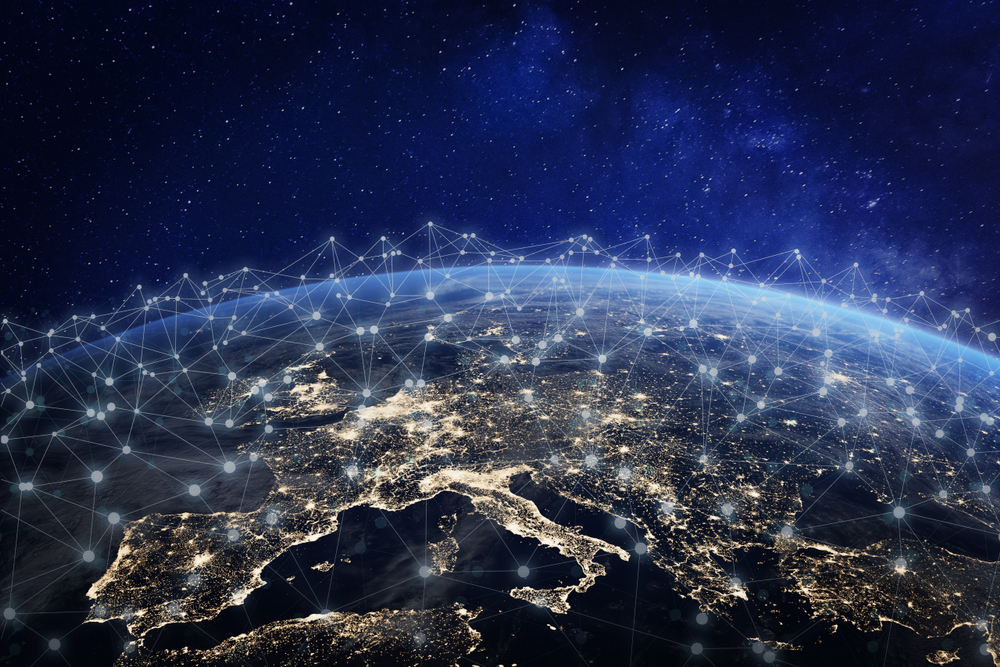Imagine standing at the edge of a vast fork in the road, one path glimmering with the promise of innovation and unity, the other shadowed by oppression and decay. Throughout history, civilizations have faced moments of reckoning—turning points where the choices of a generation ripple through centuries. But today, with accelerating technological advancements and looming global challenges, humanity is hurtling toward a crossroads unlike any other.
Will we unlock a future defined by collaboration, unprecedented breakthroughs, and sustainability? Or will we succumb to the forces of division, authoritarian control, and ecological collapse? With each passing day, the decisions we make—individually and collectively—draw us closer to one of these realities.

The Evolutionary Leap: Embracing Innovation and Unity
Humanity has always been driven by a remarkable capacity for progress. From harnessing fire to exploring the cosmos, our collective ability to innovate and adapt has shaped the course of history. Today, we stand on the cusp of what could be our greatest leap yet—one marked by technological breakthroughs, cultural unity, and sustainable solutions to the challenges we face.
Technological Breakthroughs as Catalysts
Advancements in artificial intelligence, renewable energy, and biotechnology offer unprecedented opportunities to redefine how we live. For instance, renewable energy innovations like solar-powered microgrids could provide sustainable power to even the remotest regions, bridging gaps between developed and developing nations. Similarly, AI holds the potential to revolutionize industries, from personalized medicine to climate modeling, fostering global solutions to systemic problems.
However, these advancements are not just about convenience—they carry the promise of uniting us. Imagine a world where diseases are eradicated through collective research or where climate crises are mitigated by shared technological resources. These possibilities illustrate how progress, when guided by ethics and equity, can be a force for collective upliftment.
The Role of Global Interconnectedness
In an era defined by globalization, the barriers that once divided nations and cultures are breaking down. The internet, social media, and global trade have created an interconnected world where ideas, cultures, and technologies can flow freely. This interdependence is not merely a byproduct of progress; it is a tool for collaboration. From international climate agreements to cross-border scientific partnerships, humanity’s ability to work together is proving critical in addressing global issues.
Experts suggest that the challenges we face today—climate change, pandemics, and economic inequality—are too complex for any one nation to tackle alone. As historian Yuval Noah Harari puts it, “The only solution to global problems is global cooperation.” This underscores the need for unity as we strive for a future that benefits all.

Cultural Evolution: Moving Toward Unity
Technological and environmental progress alone isn’t enough to propel humanity forward; cultural evolution is equally vital. The rise of grassroots movements advocating for equality, sustainability, and justice signals a shift in collective consciousness. Younger generations, in particular, are leading calls for systemic change, demanding accountability from governments and corporations alike.
This cultural shift is crucial for creating a shared vision of humanity’s future. As societies begin to prioritize empathy, collaboration, and long-term thinking, the possibility of an evolutionary leap becomes not just a dream but a tangible path forward.
From cutting-edge technology to a growing sense of global unity, the potential for evolution is real—but it requires intentional choices. For every opportunity to move forward, there’s an equal risk of falling back into old patterns of division and control. This leads us to the darker road humanity might take: one of authoritarian collapse.
The Authoritarian Collapse: A Descent into Dystopia
As humanity stands at a crossroads, the dark specter of authoritarianism looms large. History has shown that crises—be they economic, political, or environmental—often provide fertile ground for the consolidation of power. Under the guise of ensuring security and stability, leaders and governments have historically curtailed freedoms, tightened control, and eroded democratic norms. Today, the same trends are emerging, with global crises increasingly being used as pretexts for authoritarian rule.
Surveillance technology, originally intended to protect, has become a double-edged sword. In many parts of the world, facial recognition, data analytics, and AI-driven monitoring systems are being leveraged to suppress dissent and manipulate public opinion. The loss of privacy under such regimes not only undermines individual freedoms but also deepens societal divisions, as people are reduced to mere data points in systems they cannot influence. The result is a chilling landscape where citizens are subjected to pervasive control, creating an illusion of safety while freedom disappears.
Even democracies are not immune. The erosion of institutional checks and balances, coupled with rising polarization and misinformation, has led to a global trend of “democratic backsliding.” This slow decay of democratic norms creates openings for authoritarian tendencies to grow. If these patterns continue unchecked, the promise of progress risks being overshadowed by regression, leaving humanity vulnerable to a future defined not by collaboration and innovation, but by control and division.
The Role of Technology: Savior or Saboteur?
Technology stands at the center of humanity’s crossroads, offering both immense potential and significant peril. On one hand, it has fueled extraordinary advances—artificial intelligence capable of predicting pandemics, renewable energy solutions combating climate change, and communication tools connecting billions of people worldwide. These innovations hold the power to drive an era of unparalleled collaboration and progress, pushing humanity toward a brighter future.
However, the same technologies that promise evolution can also serve as instruments of control. AI, for example, has been weaponized for mass surveillance and social manipulation, with authoritarian regimes using it to monitor citizens and suppress dissent. Social media, designed to foster connection, often amplifies misinformation and fuels societal polarization. The misuse of these tools raises ethical dilemmas, as unchecked technological power increasingly threatens privacy, autonomy, and freedom.
The outcome depends on how humanity wields these tools. Will we establish ethical guidelines and global cooperation to ensure technology serves as a force for good? Or will we allow it to deepen existing divides and solidify authoritarian control? The answer lies not in the technology itself, but in the choices we make about its development and governance—a reflection of our collective values and priorities.
Environmental Urgency: A Ticking Clock
The planet’s rapidly deteriorating health adds urgency to humanity’s crossroads, intertwining environmental crises with societal and political challenges. Climate change, biodiversity loss, and resource depletion are no longer distant threats; they are immediate realities that exacerbate inequalities, spark conflict, and destabilize nations. These environmental pressures could either catalyze global cooperation or drive authoritarian responses under the guise of emergency measures.
Extreme weather events, rising sea levels, and food insecurity have already begun to displace millions, creating waves of climate refugees and straining international systems. In many cases, governments respond with isolationist policies, fortifying borders and centralizing power rather than addressing root causes. This reactionary approach not only deepens global divisions but also paves the way for authoritarian governance under the pretext of maintaining order during ecological crises.
Yet, the same environmental challenges also hold the potential to unite humanity. Efforts like the Paris Agreement demonstrate that large-scale collaboration is possible when the stakes are high. By embracing renewable energy, sustainable agriculture, and conservation efforts, nations can work together to combat ecological degradation and build resilience. The question remains whether humanity will rise to the challenge or succumb to fear and division, allowing environmental collapse to accelerate societal decline.
What’s Next? Key Decisions for Humanity’s Future
The path forward demands intentional choices that will define humanity’s trajectory for generations to come. At this critical juncture, governments, organizations, and individuals must confront pressing questions: Will we prioritize collaboration over conflict, equity over division, and sustainability over short-term gain? The answers to these questions will determine whether we evolve toward progress or collapse under pressure.
Leadership rooted in adaptability and ethical responsibility is essential. Policymakers must prioritize frameworks that balance technological innovation with strict ethical oversight, ensuring advancements benefit humanity as a whole rather than deepening inequalities. Similarly, grassroots movements advocating for environmental justice, human rights, and democratic accountability play a vital role in shaping the global agenda and holding power structures accountable.
Perhaps most importantly, individuals have a stake in shaping the future. Everyday choices—consuming sustainably, advocating for transparency, and participating in civic action—contribute to the larger narrative of humanity’s direction. As the world faces challenges of unprecedented scale, the collective power of billions of small actions could tip the balance. Whether humanity takes the path of evolution or collapse depends on our willingness to embrace cooperation and confront these existential challenges with courage and purpose.
Humanity’s Great Gamble
Humanity stands at a pivotal moment, poised between two vastly different futures. The choices we make today will determine whether we unlock a new era of innovation, unity, and sustainability, or spiral into authoritarianism and societal fragmentation. The stakes are extraordinary—this is not merely about survival but about defining the essence of what it means to be human in the face of adversity.
The potential for an evolutionary leap is within reach, driven by technology, collective action, and the shared challenges that bind us together. But this progress hinges on our ability to act with intention, ensuring that power is distributed equitably, freedoms are protected, and the planet’s well-being remains central to our decisions. Equally, we must resist the pull of fear and division that could steer us toward authoritarian collapse.
The path forward is neither predetermined nor easy, but it is ours to choose. As individuals, communities, and nations, we hold the tools to shape the future—a future that will either be defined by progress and possibility or by regression and control. The question remains: will we rise to the occasion, or will we let the moment slip through our fingers? The time to decide is now.

